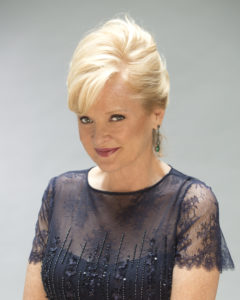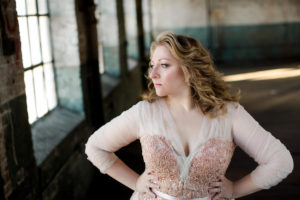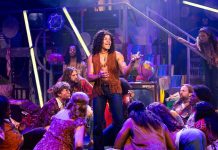From the nexus of divas, dollars, and diplomats at this year’s Washington National Opera Gala, there arose a thrilling truth: The finely frocked foreigners in attendance might question America’s role in the world at this moment in history, but they surely can’t question our ability to produce great opera singers.

Hosted by two-time Tony-award winner Christine Ebersole, with an audience largely populated by diplomats and other dignitaries of state, the gala featured a range of works, including “My Man’s Gone Now” from Gershwin’s Porgy and Bess, sung with a blast of sorrow by American soprano Latonia Moore. It was a tantalizing preview of what to expect from Moore when she performs the role next season with the company.
There was also American bass Soloman Howard’s deft “Il lacerato spirito” from Verdi’s Simone Boccanegra, which more than hinted at his potential for greatness. Howard finessed the Verdi with legato phrasing, although later in the program, when the WNO Domingo-Cafritz Young Artist Program alumnus sang “Some Enchanted Evening” from Oscar and Hammerstein’s South Pacific, he suffered somewhat from faulty breath control near the song’s end.
This season’s Domingo-Cafritz Artist-in-Residence, American bass-baritone Alan Held, also performed. Heard recently as Baron Scarpia in WNO’s Tosca, Held was in his element singing in German, which sounds especially nice in his voice. He infused longing into Wagner’s dreamy “O du mein holder Abendstern”, the lyric aria sung by the character Wolfram in Tannhäuser.
The Wagner opera presumably was featured because, as it was revealed during speeches midway through, it was the first of the Germanic composer’s opus seen by the night’s honoree, long-time WNO supporter and trustee, and inveterate Wagner fan, John J. Pohanka.

The focus might have been Wagner, but the night belonged to American dramatic soprano, Christine Goerke. When her voice grew too large for her previous repertoire (Mozart and Handel mostly) she nearly left singing altogether. Now, she has found her home in Wagner and other dramatic heavyweights large enough for her to fill with her tremendous sound. This seems to have given her a confident yet deferential demeanor, reflecting a dual comfort with her voice and Wagner’s intentions. She is so damned glorious to hear, and yet she manages to sing in service to the composer, not to herself. Her “Dich, theure Halle”, from Act 2: Scene 1 of Tannhäuser, was appropriately infused with the character Elisabeth’s reverence for a sacred place for singing.
By the last performance of the evening – the immolation scene from the final act of Wagner’s Götterdämmerung – I was reflecting on my good luck to live in a time when Goerke is singing. It’s not every generation that is blessed to hear such a pairing of power and beauty in live performance. Goerke will return to the Kennedy Center later this year to perform Act II of Wagner’s Tristan and Isolde with the National Symphony Orchestra.
La Goerke was also implicated in the two most memorable moments for Maestro Evan Rogister’s WNO orchestra as they played from atop the stage instead of the pit below. The first was during the Easter Hymn from Mascagni’s Cavalleria Rusticana. As Goerke pinned her voice to the back of the hall midway through, Rogister invited his musicians to let it rip. Goerke’s voice sailed above the towering wall of sound, and the absurdity of hearing one soprano effortlessly overtake 70 fortissimo instruments made me giggle.
That’s not to detract from the orchestra; despite the volume, they remained sensitive, and I appreciated hearing the hymn together with the sweet and pretty “Intermezzo”. So rarely do we ever hear that instrumental piece played live instead of as the filler between longer pieces and news at the top of the hour on classical public radio.
The other notable moment was the immolation scene. As Brünnhilde, Goerke’s bright-eyed declaration of immortal love for Siegfried, sung just before she enters his funeral pyre, was compelling, but what moved me to tears was how the orchestra lovingly cradled the concluding moments of the score which follow her decision to die with her lover, thus tying up all the themes in the Ring Cycle.
Goerke’s rendition of Princess Eboli’s aria, “O don fatale” from Verdi’s Don Carlos, gave me momentary pause, only because I have never heard it sung so big before. But then I considered that of all the Italian composers, I usually find that Verdi’s women are scored for bigger voices than the ages or supposed temperament of the character, so I decided it was right that Goerke’s maximum sound would blow out any cobwebs on Eboli’s anger with herself or her beauty, which are at the aria’s heart.
There was a moment of irony when Held, together with Goerke, sported feather boas while applying their heroic sounds to the silly, comedic Papageno-Papagena duet from Mozart’s Die Zauberflöte.
My enduring frustration with the hall’s acoustics surfaced as the full sound of the chorus positioned at the back of the stage was dampened, but I still enjoyed hearing them in the night’s opening work, “Freudig begrüssen wir edle Halle”, from Act II of Tannhäuser, and also with Ebersole in her breezy sell of Weill’s “Saga of Jenny” from Lady in the Dark and the more contemplative “On a Clear Day” from Lerner and Lane’s On a Clear Day You Can See Forever.
The swanky gala, beginning with cocktails and sushi on the Kennedy Center’s riverfront patio, and ending with a slew of embassy row invitation-only dinners, helped the company surpass its one million dollar funding goal by several thousand dollars. According to comments during the gala made by WNO General Director Timothy O’Leary, it also helped secure an anonymous donor’s promise of future matching funds that potentially could more than double that haul. The money is for WNO’s community outreach programs.
Running time was 90 minutes with no intermission
Washington National Opera’s annual gala was held on Saturday, May 18 at 6:00 pm at the Kennedy Center – 2700 F Street, NW, in Washington, DC. For more information on Washington National Opera events, go online.




